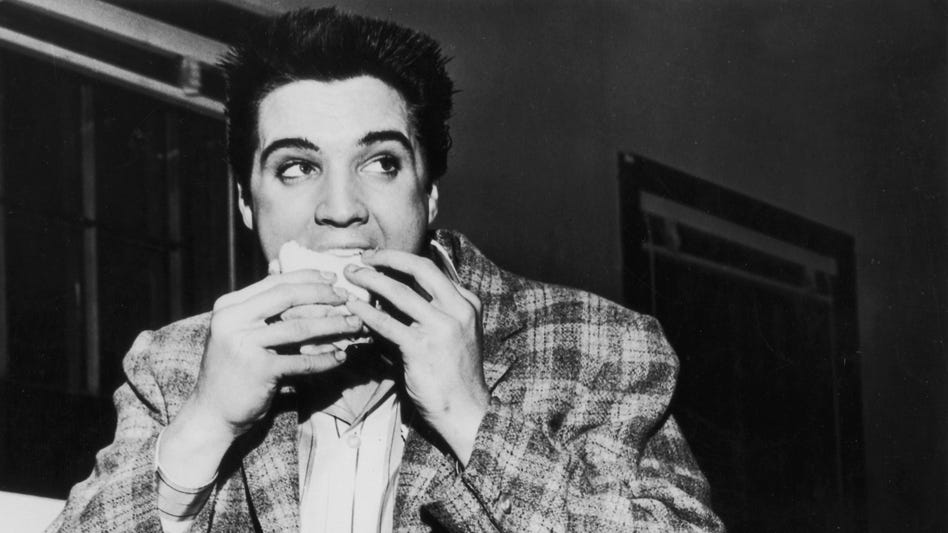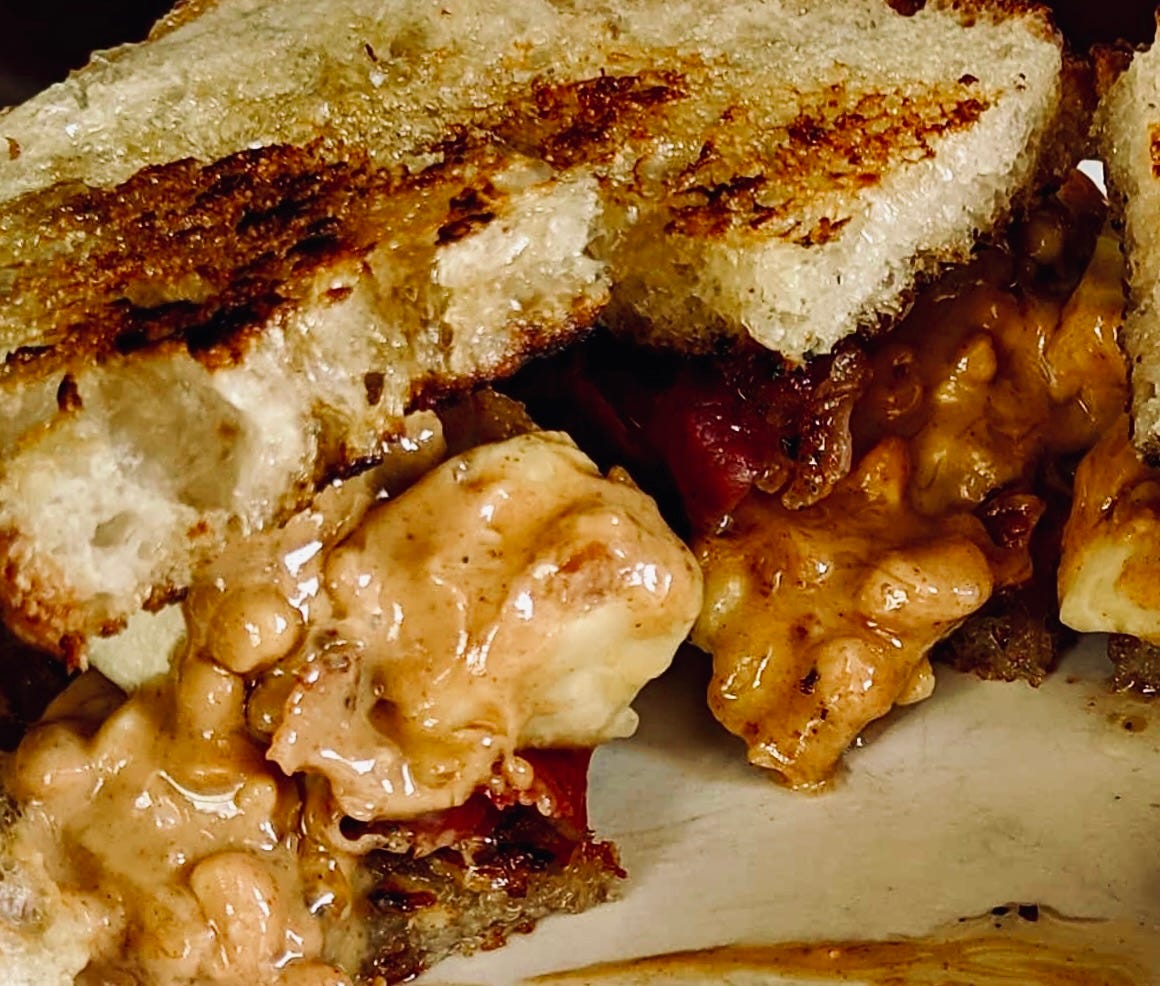Welcome back to Notable Sandwiches, a weekly feature in which my editor David Swanson and I nibble our way through the bonkers document that is Wikipedia’s List of Notable Sandwiches, in alphabetical order. This week, a symbol of rock ‘n’ roll dissipation: the Elvis.
The 2022 fever-dream-cum-biopic Elvis never shows us the Elvis sandwich—peanut butter, bacon, banana, white bread (or peanut butter, bacon, honey, sourdough; or maybe just peanut butter and banana; sources differ). In fact, the film never shows us fat Elvis at all, except for one scene, in which actor Austin Butler’s waistline has expanded from its preternatural litheness to something more resembling the girth of an ordinary human being. We never see Elvis eat anything but pills, or drink anything but a martini, plucked off an audience member’s table and sucked down mid-onstage Vegas breakdown.
There’s plenty of Presley’s dissolution in this movie, which ticks all the boxes of the rock-bio arc in deliberate and visually extravagant fashion: the scrappy comer from the sticks with a dream, the hangers-on parasitizing the fledgling star, and the long, slow slide into dissipation. Luhrmann’s rococo visuals are never dull, Butler is bright-eyed and plays stardom and tragedy with affecting sincerity, and the meticulous attention to recreating aesthetic detail is a joy to behold. As a whole, though, the movie cants heavily into the absurd, and its elision of the change in Presley’s body is just a part of its highly selective view of an abrogated life. Weight is referred to only once, in voiceover, as a news anchor snidely remarks on the singer’s potential casting in A Star Is Born, noting that Presley’s “struggles with his waistline make him an ideal choice for a washed-up star.”
Yet even throughout the back half of the movie, in which Butler truly earns his chops as the world’s highest-paid Elvis impersonator, we’re shown every type of debauch except the type the latter-day King was most famous for: daring to acquire a paunch as he entered his forties, via eating food, including his namesake sandwich. It’s perhaps implied—in a film whose villain is a wildly scenery-chewing Tom Hanks, enhanced with an erratic Dutch accent and a digitally applied wattle of hanging fat—that showing Presley’s own jowls would cause confusion between hero and villain.
The film is about as subtle as a rhinestone jumpsuit: angelic Priscilla, who would have saved him if she could; troubled Elvis, who steals Black music and dance, but only out of his deep respect for them—and is even possibly a civil rights hero (the role of race in this movie is as bizarre as anything else). The embodiment of evil in this movie is Hanks as avaricious manager Colonel Tom Parker, stomping around whacking things with his cane and uttering lines like “This entire jamboree is an embarrassment!” I must emphasize that not only is Tom Hanks extremely distracting as a Dutch villain, Luhrmann also made the baffling choice of making this character the narrator of the film, and thus both bewildering and ubiquitous.
The Sword and the Sandwich is a reader-supported publication. To receive Sunday’s culture posts and support two hard-working journalists for the price of one, consider becoming a paid subscriber.
Not coincidentally, the sinister “Colonel” spends the entire movie in a fat suit, while Presley’s whittled cheekbones gleam with bronzer, and increasingly elaborate jumpsuits hang off of his spare frame. Combine all that with Parker’s gambling debts—which drive him to imprison Elvis in the gilded cage of interminable Vegas residency—the visual language of fat as immoderacy and greed is as jarring as the rest of the movie. We watch as a star degrades, crumpling into nothing under the pounding force of adulation, but the film—a Best Picture nominee, alongside fellow fat suit showcase The Whale—wants us to know that fatness is a state akin to and preceding death itself, and the whole lush spectacle averts its eyes from the expansion of the star’s waistline as it has not shied away from his descent into addiction.
In the culture at large, Fat Elvis has been a punchline for longer than I’ve been alive, and the Elvis sandwich—in its most notorious iteration, consisting of a whole loaf of French bread, a pound of peanut butter, a pound of bacon, and a pound of mashed bananas—is an integral part of that legend. It’s knowledge you gain by cultural osmosis, just as much as any piece Presley’s legend. And the cruel, seedy coverage of his weight gain in his latter years may have accelerated his decline as much as anything else.
Even now, death-anniversary coverage cites Elvis as a “cautionary tale”—less because of the booze than because America’s most famous gyrating pelvis had lost his iconic sex appeal by the end. There’s always been an aura of tragedy hanging over the handsome face on the album covers, the story of a rock star whose life began in tragedy and ended too soon—not due to external circumstance, like Buddy Holly’s, but because of the toll of his own appetites. It was the pills that made Presley’s last performances so painful to watch—his slurred speech and heavy sweat a terrible counterpoint to that great voice, the baritone rich as Tupelo honey, the fingers still so nimble on the piano keys, a consummate showman even at the brink of death.
Ever since his passing, on August 16, 1977—two months after that final, shattering performance of “Unchained Melody”—there have been numerous sightings of Elvis reported in the tabloids, alongside UFOs, yetis, boogymen. His ghost is persistent, appearing in America’s shopping malls and parking lots and on its long, lonely highways with the same regularity that that voice flows out of the radio. He died young, he died fat, he died having been loved more ardently by more people than any of us ever will. And for this reason, the disbelief that he’s gone remains even now, almost a half-century later.
In the Luhrmann’s depiction, the notion of Elvis as an Adonis who never lost his essential innocence—whose body never changed, even as he was destroyed, and destroyed himself—sticks in my craw. Other things feel like creative misdirection, but this feels like a lie. It is no more shameful than any other piece of his downfall that his consumption of everything—food and drugs and the love of strangers—became ever more avid as he was consumed from within. Inherent in Presley’s life—or as the somehow even more thuddingly obvious screenplay puts it, “the beauty and greatness of the tragic American opera of Elvis’s life”—was salt, and sweetness, and the solid starch he brought from Mississippi to Memphis to the world.
Lurhmann may have loved the King before ever writing about him, and before he filmed a frame. But you can’t edit out the man who created a colossus of a sandwich from the colossus of his life and claim your love is complete. The man and his appetites were inextricable, his thefts and his losses and his tragedies laid out in grand American guignol, before the insatiable appetite of the public, which even now seeks ardently to oust him from his grave.









I didn’t get the impression Lurrman (sp?) even liked Elvis.